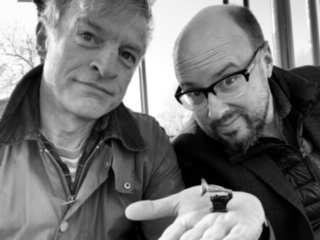This episode is a little bit different. Dave interviews co-host James about his novel on the early days of recorded sound, The Industry of Human Happiness. James tells how he chanced upon the adventures of Fred Gaisberg and William Sinkler Darby in the sleeve notes of a CD that he bought outside a concert, andContinue reading “James Hall finally tells all about his book The Industry Of Human Happiness – its the new episode of The Sound Of The Hound podcast!”
Tag Archives: maiden lane
Recording Pioneers- Part 7, William Barry Owen
Name: William Barry Owen Born: 15 April 1860 Resident: Born in Vineyard Haven, Massachusetts Occupation: Sent to London to raise investment funds for the Gramophone Company to expand into Europe Loves: Music, Musicians, Gambling, London high society parties In July 1897 William Barry Owen resignedContinue reading “Recording Pioneers- Part 7, William Barry Owen”
Nipper 1884 – 1895
Name: Nipper Born: 1884 Resident: London Occupation: Posing for paintings, attacking Gramophones, looking for His Masters Voice Loves: Being a world famous icon, treats Francis Barraud’s painting of a fox terrier to an early gramophone remains one of the oldest and best-known of trademarks and records logos. It was a brilliantly conceivedContinue reading “Nipper 1884 – 1895”
The Four Major record companies in the UK (in 1924). #1
We’ve stumbled across a wonderful book called “The Talking Machine Industry” written by Ogilvie Mitchell in 1924. It is a bit of a hack job to be frank. Mr Mitchell’s style is frothy and he gallops across a range of subjects to do with the history of recorded music at that point (i.e. less thanContinue reading “The Four Major record companies in the UK (in 1924). #1”
Recorded music sales are growing exponentially. Supply can’t keep up with demand….
….in 1898! We followed how the Gramophone Company and its German sister company had some significant teething problems with the production of discs during the first year of business in 1898. Whilst the English company was dependent upon its discs coming from Germany it had also agreed to source its gramophones from the American manufacturingContinue reading “Recorded music sales are growing exponentially. Supply can’t keep up with demand….”
The main problem with starting new businesses…
…is getting all the ducks in a row. The early recording business proved no different. Emile Berliner decided to set up his European disc pressing factory in Germany rather than England in 1898. In doing so he created the German Gramophone Company – aka Deutsche Grammophon (DG). Berliner’s European operations were therefore split in two.Continue reading “The main problem with starting new businesses…”
Setting up a record company #6 Getting the right people onboard
This week we plan to tell the story of how Emile Berliner and Fred Gaisberg set up their record company in America. Seven blog entries on seven days. This is day #6. It’s late 1895 and the fledgeling gramophone enterprise has just raised $25,000 from the Philadelphian syndicate to expand the business. Berliner now beginsContinue reading “Setting up a record company #6 Getting the right people onboard”
Setting up a record company: #1 Get the technology right
When William Barry Owen and Trevor Williams shook hands to establish the UK’s first record company, The Gramophone Company, in 1897 they sent for Fred Gaisberg, an American “recording expert” to come over to England to help them by setting up the recording department and the UK’s first recording studios in Maiden Lane. Fred’s involvementContinue reading “Setting up a record company: #1 Get the technology right”
Publicity photos of the early Gramophone stars #2 Albert and ‘is old Dutch
This is the second in a series of publicity shots from the early years of the recording business that our friends at the EMI Archive Trust have made available to us. These two photos are of Abert Chevalier who was a comedian, actor and music hall star at the turn of the last century. HeContinue reading “Publicity photos of the early Gramophone stars #2 Albert and ‘is old Dutch”
“That faint perfume of the salons” The Gramophone Company moves into Opera. 1902.
In the early days of their UK business (i.e. before 1900), Gaisberg and the Gramophone company made good headway in persuading music hall stars and comedians to record with the new Gramophone technology. They found it much more difficult to persuade the great Opera singers of the day to condescend to do so. To tryContinue reading ““That faint perfume of the salons” The Gramophone Company moves into Opera. 1902.”

